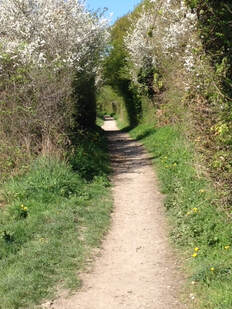Walk and Talk

What is outdoor / walking therapy?
Also known as ‘walk and talk’, this is when sessions take place outside in nature, usually walking side by side. For some people, walking and talking in a natural environment feels less challenging and less formal than sitting in a clinic room. For others, it might be an introduction to therapy and a stepping stone to having sessions indoors later.
As with a traditional therapy session, you decide the pace and direction. You don’t need to be super-fit. Walking for a whole session is optional: you may prefer to stop at times, or choose a place for us to sit or stand. We can be flexible to suit your needs and the conditions of the moment, both inner (feelings, energy levels) and outer (weather, terrain).
Outdoor sessions respect all the regular boundaries of confidentiality and safety, but they are a very different experience to being in a clinic room. It can feel expansive and enlivening to bring nature and movement directly into one’s therapy. Being physically active helps to release tensions, process emotions and stimulate the mind. Nature freely offers its healing presence.
Benefits of outdoor / walking therapy
‘Walk and talk’ is particularly helpful for people who feel that talking, feeling and thinking come easier when their body is in motion. Those who feel less exposed or awkward when walking side by side another person, rather than having direct eye contact, also benefit. For others, being outdoors can be a direct way of addressing fears of open spaces or social judgement – and having a therapist by your side can ease a return to engaging more fully in the world.
Alternatively, you may simply appreciate the physical and psychological benefits of fresh air, exposure to natural light and moderate exercise. Walking is invigorating and stress-relieving. And let’s not forget the easy, natural silences and sense of space that flow out of being in green, peaceful environments. Walking allows body and mind to draw closer to each other and so facilitates presence.
How does outdoor / walking therapy work?
I offer outdoor therapy in Stanmer Park, Brighton, which is easily accessed by bus, train, bike and car. Stanmer Park is spacious, offering numerous routes over a variety of terrains: flat and hilly; wooded and open; hard paths and dirt tracks. Sessions are organised similarly to traditional therapy with two exceptions:
Also known as ‘walk and talk’, this is when sessions take place outside in nature, usually walking side by side. For some people, walking and talking in a natural environment feels less challenging and less formal than sitting in a clinic room. For others, it might be an introduction to therapy and a stepping stone to having sessions indoors later.
As with a traditional therapy session, you decide the pace and direction. You don’t need to be super-fit. Walking for a whole session is optional: you may prefer to stop at times, or choose a place for us to sit or stand. We can be flexible to suit your needs and the conditions of the moment, both inner (feelings, energy levels) and outer (weather, terrain).
Outdoor sessions respect all the regular boundaries of confidentiality and safety, but they are a very different experience to being in a clinic room. It can feel expansive and enlivening to bring nature and movement directly into one’s therapy. Being physically active helps to release tensions, process emotions and stimulate the mind. Nature freely offers its healing presence.
Benefits of outdoor / walking therapy
‘Walk and talk’ is particularly helpful for people who feel that talking, feeling and thinking come easier when their body is in motion. Those who feel less exposed or awkward when walking side by side another person, rather than having direct eye contact, also benefit. For others, being outdoors can be a direct way of addressing fears of open spaces or social judgement – and having a therapist by your side can ease a return to engaging more fully in the world.
Alternatively, you may simply appreciate the physical and psychological benefits of fresh air, exposure to natural light and moderate exercise. Walking is invigorating and stress-relieving. And let’s not forget the easy, natural silences and sense of space that flow out of being in green, peaceful environments. Walking allows body and mind to draw closer to each other and so facilitates presence.
How does outdoor / walking therapy work?
I offer outdoor therapy in Stanmer Park, Brighton, which is easily accessed by bus, train, bike and car. Stanmer Park is spacious, offering numerous routes over a variety of terrains: flat and hilly; wooded and open; hard paths and dirt tracks. Sessions are organised similarly to traditional therapy with two exceptions:
- We may run slightly over the hour depending on route and conditions underfoot (it is advisable to allow for up to 75 mins).
- The initial session happens differently. Normally this will take place online, in person at my clinic, or by phone. As well as talking over what brings you to therapy, we will discuss all practicalities involved in working outdoors, including the type of walk(s) you require, relevant safety issues and confidentiality (this is important since we may occasionally encounter other people whilst outside). If it seems like a walk and talk approach would suit you, we can then arrange a time and place to meet.